Ever wondered what it takes to win a personal injury case in court? Are you familiar with the steps in the legal system for personal injury trials? And are you ready to fight for justice?
Knowing the personal injury trial process is key if you’ve been hurt by someone else’s carelessness. From getting medical care to the final decision, each part is vital for your case’s outcome. But what exactly are these stages, and how do you get ready to win?
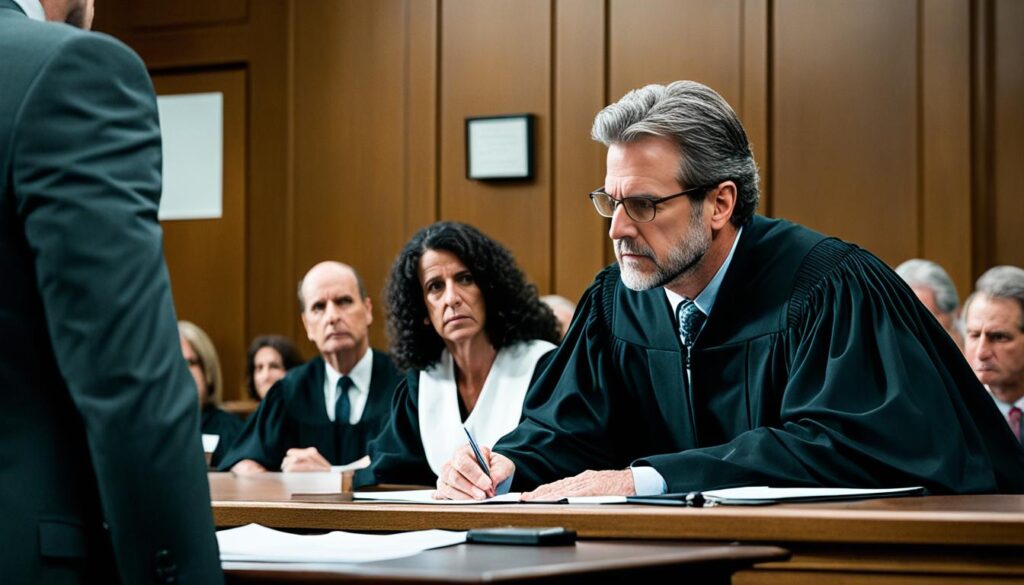
Key Takeaways:
- Gain insight into the legal process for personal injury trials
- Discover the steps involved in the personal injury trial
- Learn what to expect during court proceedings for personal injury cases
- Explore strategies for preparing and winning your personal injury trial
- Find out how to navigate the various stages of the personal injury trial process
Medical Treatment and Documentation
Getting medical help quickly is vital after an injury. It’s important for your health and as proof of your injuries. This proof is key in a personal injury trial.
Seeing a doctor means you can document everything. This includes how you got hurt, what treatment you got, and if you need more care. These records are solid evidence for your compensation claim.
If you don’t get or show proof of medical care, the other lawyer may claim your injuries aren’t serious. This can hurt your case.
Sticking to your treatment and going to all doctor visits shows you’re serious about getting better. If you don’t, it could damage your case. It might also lower the compensation you get.
Remember, proper medical care and keeping records are crucial. They’re not just for your health but also help prove your injury claim. By carefully following your doctor’s advice and keeping good records, you boost your chances of getting the compensation you deserve.
Review of Your Case with Your Attorney
After you get medical help, meeting with a personal injury attorney is key. This important step helps build a strong case for you. It aims to get you the most compensation for your injuries.
Your injury lawyer will collect a lot of info during the case review. They’ll want to know about your treatment, expenses, and what happened to cause your injury. Knowing all the details helps your lawyer find the best way to support your defense.
Your lawyer will ask detailed questions to get all the proof needed. They will carefully check the evidence. This includes medical records, witness accounts, accident reports, and more. These details help support your claim.
Your attorney will make plans to create a strong defense. They will check every detail to get you the most compensation.
Identifying Key Evidence
During the review, your lawyer focuses on finding and saving key evidence. Finding important evidence, like photos, videos, or witness stories, helps your case. It improves your chance to get the compensation you deserve.
Analyzing the Defense Case
Your lawyer also looks closely at the defense’s case. They want to know what the other side might say. Understanding the defense helps your lawyer argue better for you. It aims to protect your rights and get you more money.
The case review with your injury lawyer is a crucial step. It prepares a solid foundation for your defense. It ensures your case is well-reviewed and ready for trial.
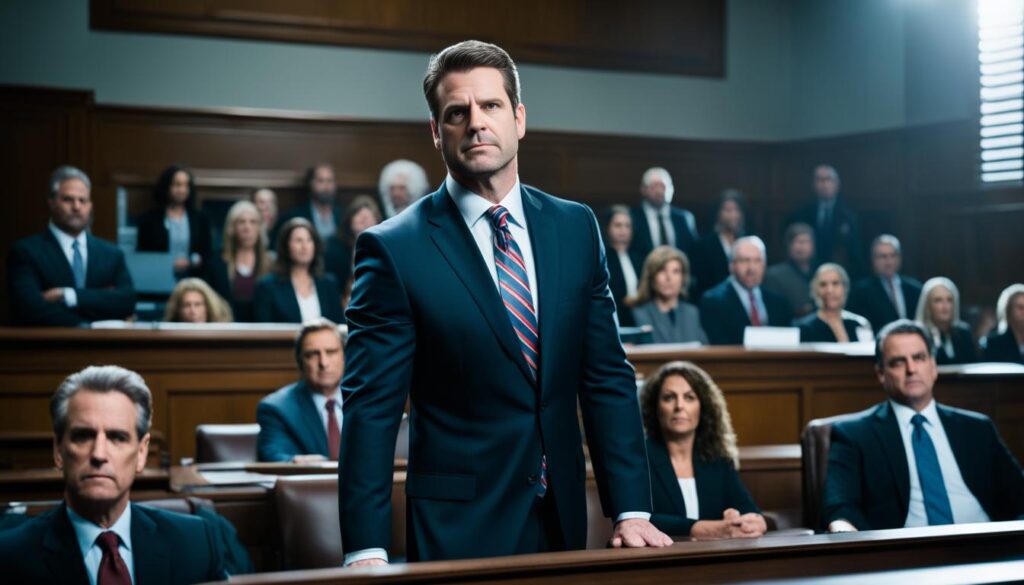
Issue Your Demand
Once you get to maximum medical improvement, you’ve finished your treatment and rehab. Now, you can make a demand for compensation. This demand is a letter that lists your treatment costs, lost income, and pain. It also covers any other costs from the accident. This is the first step in asking for compensation and often leads to an agreement before trial.
When you make your demand, be sure to include all your medical paperwork and related costs. Add your medical records, bills, and receipts. Also, include any proof that backs up your claim for compensation. This proof makes your case stronger by showing how serious your injuries and losses are.
Your demand letter should also explain how the accident has changed your life. Talk about how your injuries affect your job, daily life, and overall happiness. By sharing details about your physical, emotional, and financial troubles, you give a full picture of your losses.
An experienced personal injury lawyer is vital when writing and sending your demand. A lawyer makes sure your demand has all needed info and truly reflects your losses. They also talk on your behalf and deal with any replies or offers from the other side.
Sample Demand Letter
Dear [Opposing Party],
I’m writing to ask for compensation for the injuries and losses from the [accident/incident]. This happened on [date] at [location], leading to lots of medical treatment and expenses.
I’ve been treated by [healthcare provider/doctor] for my injuries. They recommended [surgery, physical therapy, medication, etc.], and I’ve followed their advice to heal properly.
The accident caused me a lot of physical pain, emotional stress, and mental suffering. It’s made it hard for me to work, enjoy hobbies, and take care of myself.
I’m attaching medical records, bills, and other documents. These show how badly I was hurt and how much it cost me. They help you understand the accident’s big impact on my life.
I’m asking for compensation of [dollar amount], considering my injuries, medical costs, and how my life has worsened. This amount covers all my damages and recovery costs.
This letter is the beginning of trying to settle this fairly. I’m willing to talk and settle this without court. But, if we don’t solve this within [timeframe], I might have to go to court to get what I deserve.
I hope we can solve this quickly and fairly. Please write back within [timeframe] to talk more and address my concerns.
Thank you for understanding and for your help.
Sincerely,
[Your Name]
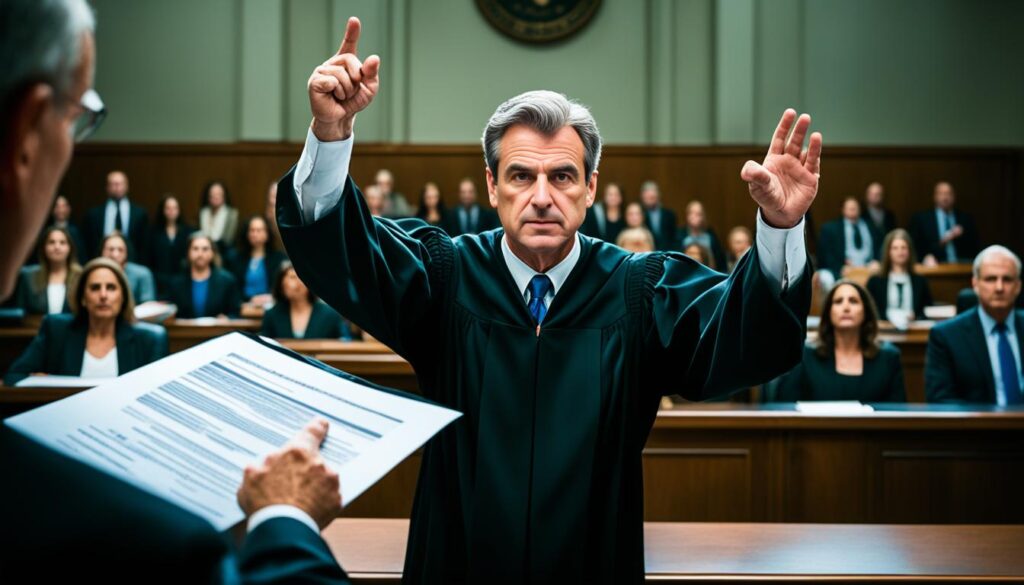
Settlement
Settlement negotiations play a key role in personal injury cases. They can happen before or during the pre-trial phase. Settling is often better than going to court. It saves time, cuts costs, and reduces stress.
Your attorney will negotiate with the other side to get you fair compensation. This process needs a good grasp of the case details. The aim is to make sure you get what you are due.
“Settling before trial can save time, money, and the stress of going to court.”
Choosing a settlement gives you more say in the outcome. You can avoid the unpredictability of a judge or jury’s decision. This chance to negotiate can help both sides find a middle ground.
Effective settlement talks need skill. Your lawyer will use their know-how to fight for you. They will check the case’s strengths and weaknesses, look at the evidence, and argue strongly for your claim.

Deciding to settle is big and should be discussed with your lawyer. They’ll explain the benefits and downsides of settling versus going to trial. The goal is a fair result that gives you the compensation you deserve.
File Personal Injury Lawsuit
If you can’t reach a settlement through negotiation or mediation, the next step is to file a lawsuit. This means hiring a skilled attorney who will prepare and file a complaint for you. By doing this, you show you’re ready to fight for compensation in court.
Filing a lawsuit is important for getting justice and money you deserve. Your lawyer will help with the filing process. They’ll make sure everything is done right with the court. Once filed, your case moves to court, bringing you closer to telling your story to a judge or jury.
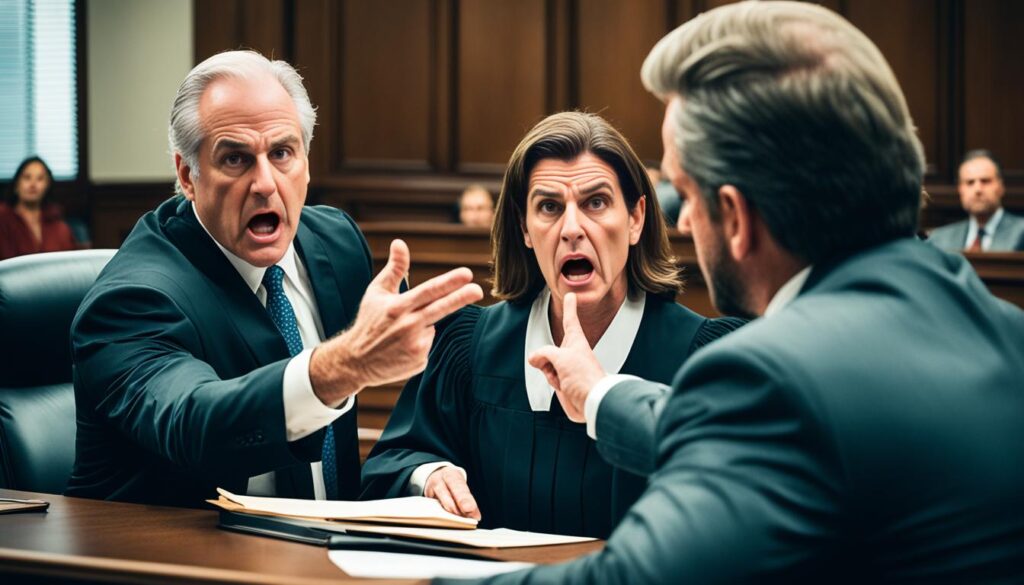
Why File a Personal Injury Lawsuit?
Filing a lawsuit does several things for you. It legally aims to make the defendant pay for your suffering. It also lets you gather and present evidence and witness stories to back your claim. By filing, you underline your determination to assert your rights and hold the offender responsible.
The Importance of Legal Action
Legal action through a lawsuit is crucial for many reasons. It provides a chance to make your case in a formal setting. This ensures your story is heard fairly and without bias.
“Filing a personal injury lawsuit sends a clear message to insurance companies and the defendant that you are serious about seeking compensation for your injuries and losses.”
This move can also press the other party to negotiate a fair settlement. Knowing you’re prepared to go to court might make them offer a better deal.
What to Expect During Court Proceedings
After filing your lawsuit, you’ll go through various court stages. It starts with the discovery phase, where both sides share info like witness accounts and medical records. This step helps evaluate the strength of each case.
Next are the pre-trial hearings to sort out any remaining issues before the trial, like evidence problems. Your lawyer will be with you, protecting your rights each step of the way.
If your case goes to trial, you can present your evidence and call witnesses. Then, the judge or jury decides if you deserve compensation. Having a knowledgeable attorney is key to make your case strong in court.
| Benefits of Filing a Personal Injury Lawsuit | Importance of Legal Action | What to Expect During Court Proceedings |
|---|---|---|
| Establishes liability | Ensures fair evaluation of your claim | Discovery phase |
| Allows for evidence collection and presentation | Pressure on opposing party to negotiate | Pre-trial hearings |
| Holds responsible party accountable | Actual trial |
Discovery Phase
The discovery phase is key in the personal injury trial process. It helps collect important evidence and share info between both sides. During this phase, depositions are taken, witnesses are heard, and evidence is checked.
The discovery phase helps unveil the truth and build a strong case. Through detailed investigation, each side can present evidence and witness statements supporting their claims.
Evidence is collected in various ways during this phase. Documents are requested, and depositions are conducted to get crucial info. Witnesses are interviewed to learn more about the incident.
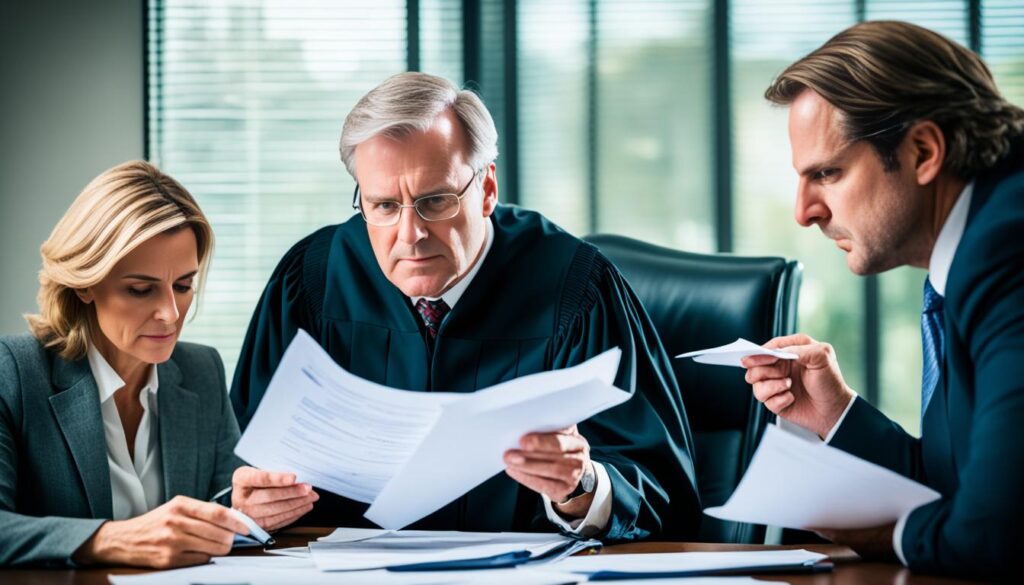
Types of Evidence
Different evidence types are gathered in the discovery phase:
- Physical evidence: Includes objects connected to the incident like photos, videos, or damaged property.
- Documentary evidence: Official records, medical or police reports, and other documents that support the claims.
- Expert testimony: Opinions from professionals, like medical experts, that give valuable insights to the case.
- Witness testimony: Statements from people who saw the incident or have crucial info support both sides’ claims.
The Importance of Discovery
The discovery phase shapes a personal injury trial’s direction. It lets both sides assess evidence and witness testimony strength. This process fosters transparency and supports a fair judicial system by sharing information.
Types of Evidence in the Discovery Phase
| Evidence Type | Description |
|---|---|
| Physical evidence | Objects or items directly related to the incident (e.g., photographs, videos, damaged property). |
| Documentary evidence | Official records, medical reports, police reports, or other relevant documents supporting the claims. |
| Expert testimony | Opinions and testimonies from professionals (e.g., medical experts, accident reconstruction specialists). |
| Witness testimony | Testimonies from individuals who observed the incident or possess crucial information related to the case. |
Pre-trial Mediation
Before a trial, parties in a personal injury case can try pre-trial mediation. In this process, a judge or mediator helps both sides talk and try to settle. This step saves time, lowers stress, and cuts costs of a court trial.
A mediator or judge, staying neutral, helps them compromise to meet everyone’s needs. They aim to make everyone talk openly and reach a mutual agreement.
In mediation, everyone can share their views in a respectful setting. They listen to each other. The mediator suggests ideas to help reach a good compromise.
Benefits of Pre-trial Mediation
Pre-trial mediation has many pluses for personal injury cases. It can lead to a quicker solution than a trial. People involved keep control over the end result since they agree together, not a judge or jury.
Mediation also keeps good relationships, which matters in cases where people know each other outside the case. It encourages working together instead of fighting in court. By discussing settlements, parties aim to solve their issues without the risks of a trial.

| Benefits of Pre-trial Mediation |
|---|
| Quicker Resolution – Mediation can lead to a faster resolution compared to a trial. |
| Control over Outcome – Parties involved maintain control over the agreement rather than leaving it to a judge or jury. |
| Preserves Relationships – Mediation can help maintain relationships between parties involved in the case. |
Personal Injury Trial
If a settlement isn’t reached through mediation, the case goes to trial. This is the final step in the legal process. It’s where all the evidence is shown, witnesses are questioned, and lawyers make their statements.
The trial’s length varies based on the case’s complexity. It can last from one day to a week. In this phase, the plaintiff’s lawyer works to prove their client’s claims. They show evidence of damages and liability. The defense lawyer, however, questions the validity of these claims and presents their own arguments.
The involvement of a jury is crucial in a personal injury trial. This group of community members listens to the evidence. They then reach a verdict that’s fair and unbiased.
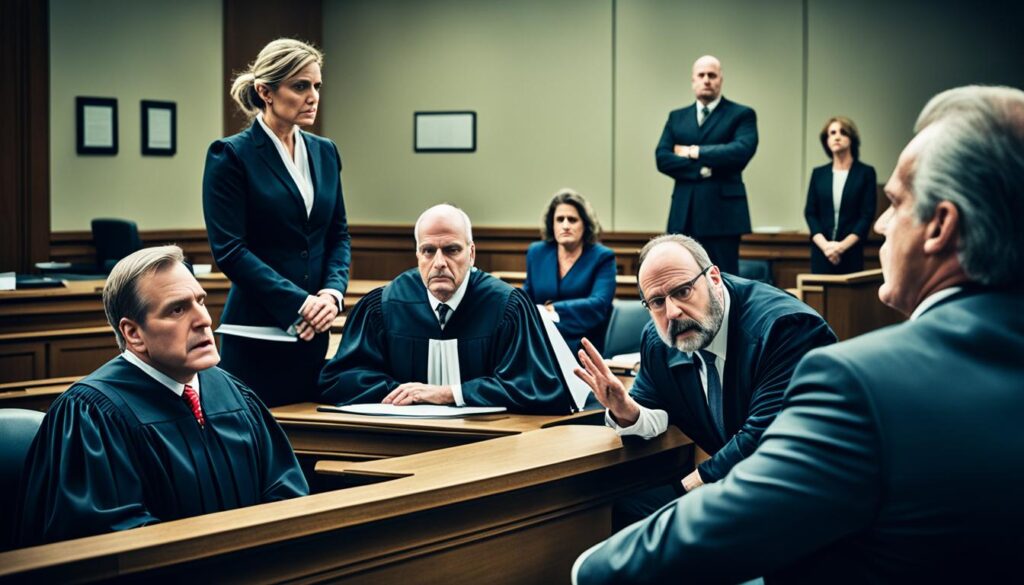
The trial begins with opening statements from both the plaintiff and defense attorneys. These statements highlight the main points of the case. They prepare the jury for the evidence to come.
The plaintiff’s attorney then calls witnesses and presents evidence, like medical records and expert opinions. The defense gets to question these witnesses. They also challenge the evidence’s reliability and can bring forth their own witnesses.
After presenting their cases, both sides give closing arguments. These summaries underline the key evidence supporting their positions. The goal is to convince the jury.
Then, the judge gives the jury legal guidelines to follow when deciding on a verdict. The jury discusses the case in private after this.
When the jury decides, they announce their verdict in the courtroom. This decision is final and determines if the plaintiff wins compensation.
Going through a personal injury trial is the last step in seeking justice and compensation. Having a knowledgeable attorney is crucial. They can defend your rights and help achieve a positive outcome.
Your Role at Trial
As the plaintiff, your role at trial is critical in the personal injury trial. You get to testify and answer key questions about your case. Your lawyer will help you get ready to speak in court. It’s vital to stay calm, clear, and focused when you share your story.
This can greatly influence your case’s outcome. During the trial, you’ll tell your side and explain what caused your injury. Your story helps prove why you should get compensation. Being honest and consistent is key because any mixed-up details could hurt your case.
You might also be questioned by the other lawyer. This is called cross-examination. It’s their chance to test if your story holds up. Staying cool and truthful during this time is very important.
Your lawyer will support you the whole time, offering advice and answers. They’ll get you ready for any tough questions and show you how to act in court. Your job is to present your case well and truthfully.
With your lawyer’s advice and staying calm, you can make a strong case. This improves your chances of a good outcome.

Testimonials:
“Testifying in court made me nervous at first, but my attorney really helped me get ready. They made sure I felt confident and could speak effectively. Thanks to their efforts, the trial went well, and we won. I’m so thankful for their support.” – Sarah Johnson, Personal Injury Plaintiff
Getting to a Verdict
After each side shows its evidence, the judge or jury starts to think it over. They decide the verdict, which is really important. It decides if you get money for your injury.
If you win, the other person might have to pay you. This amount is based on what was shown in court. It’s meant to cover your injuries, bills, lost wages, and stress.
Sometimes, either side can disagree with the verdict and appeal. An appeal asks a higher court to look at the trial’s decision again. This is because they think a mistake was made during the trial.
An appeal might keep the verdict the same, change it, or call for a new trial. This process is very complicated. Your lawyer will help you through it if you need to appeal. They make sure your rights are looked after.
The verdict is a big deal in your injury case. It ends the trial and decides if you get compensated. Win or lose, having a good legal team is key. They help deal with the trial and anything that comes after.
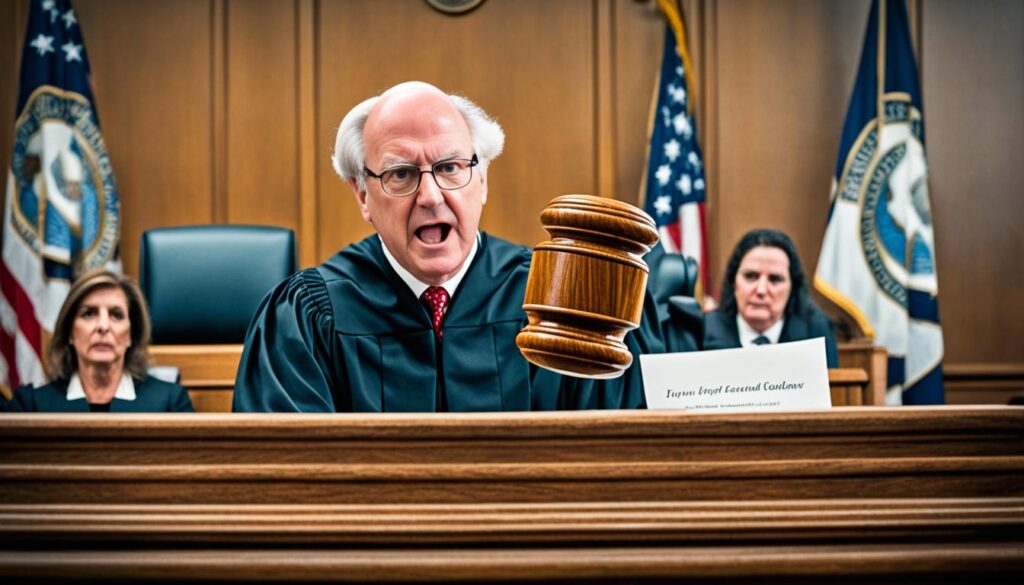
Our Ohio Personal Injury Lawyers Are Here to Help
If you’re looking for help with a personal injury case, our Ohio lawyers are here for you. They have years of courtroom experience. They’re ready to provide aggressive representation and help you get the compensation you need.
Our team knows the ins and outs of personal injury trials. They will guide you at every step.
Have you been in a car accident or had a slip and fall? Our attorneys are ready to fight for you. They work hard to build strong cases for our clients. Their goal is to get you the justice and compensation you deserve.
Reach out today for a free talk about your case. We’ll listen, give you top legal advice, and show you your options. Let our experienced lawyers handle the legal side of things. You just focus on getting better. We’re here to stand up for your rights and the justice you’re owed.